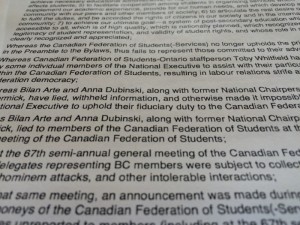The Canadian Federation of Students-British Columbia (CFS-BC) had its semi-annual general meeting from August 13 to 16; the meeting agenda contained several motions condemning the national Canadian Federation of Students (CFS) organization.
The motions talk in detail about how the BC branch of CFS (which is a separate legal entity from the national CFS) has “no confidence” in the national branch and explicitly calls for the resignation of CFS national chair Bilan Arte, who took over from Jessica McCormick earlier this year. The national CFS office has faced criticism from CFS members for allegations of corruption and union-busting, which McCormick denied to Nexus in April.
The motions go on to say that the CFS should no longer have contact with Arte and McCormick and explain how CFS-BC is losing confidence in the national executive, suggesting ways to distance themselves from the national CFS.
CFS-BC chairperson Simka Marshall says that after roughly 10 months of what she calls “frustration” with the Ottawa office of the CFS, the executive committee of CFS-BC was “forced to recommend organizational changes to our upcoming meeting,” she told Nexus before the meeting.

Marshall says that the motions were directed towards the national executive and not the national CFS organization as a whole.
“The actions of the national executive, and in particular the at-large members of the national executive, have been counter to the bylaws, the laws that govern the organization, the principles of the federation, and, in some cases, the very purpose of the organization,” Marshall told Nexus in a second interview after the CFS-BC meeting. “The resolutions adopted unanimously at this most recent general meeting aim to resolve the outstanding issues, and those resolutions have weight because BC member local unions are a part of the national organization.”
Arte says that she remains “committed to continuing to fight for a system of postsecondary education that is equitable and accessible for all” despite these problems.
“Students in all parts of the country benefit from a strong national and provincial students’ union,” she says. “We are disappointed with the tension and division that is being created between some members in BC and other members across the country, but we remain committed to working to resolve any issues that may exist.”
Marshall says that members voting at the CFS-BC meeting “unanimously voted to censure Ms. Arte and call for her resignation.”
“She oversaw a fraudulent election which took place at the most recent [CFS] general meeting,” Marshall continues, “and also chaired a special session of the women’s constituency group, at which BC delegates were verbally assaulted, bullied, and harassed. Beyond her other transgressions against the bylaws and principles of the organizations, these aforementioned acts were deemed sufficient to call for her resignation. The additional language asking for the discontinuation of her involvement is to express that BC members would not be satisfied with her simply shifting into a different role on the national executive, nor being given a staff job. It is important to note that in recent months the at-large member of the national executive have been hiring staff without authority or ratification by the national executive, and BC members are not interested in Ms. Arte being given a patronage appointment in the national office.”
Arte insists that not all the information being given about her is accurate. Still, she remains hopeful that the student movement can remain unified and work together.
“On a personal level, I find it unfortunate that some folks have felt the need to spread misinformation about myself and other members of the national executive,” she says, “but I am optimistic that we can move forward together and put our differences behind us.”
Camosun College Student Society (CCSS) executive director Michel Turcotte is also hopeful that despite the challenges, the national student movement can work through its problems. He says that most of the motions passed, many after being debated and amended, and it “may force a reexamination of the formal relationships between the two organizations.”
“Student leaders in British Columbia believe that there has been a shift away from the founding principles of the Canadian Federation of Students and want to consider their options,” he says.
Some BC locals of the CFS have said that the national office has not been responsive to their questions and concerns, something that Turcotte says changed during the meeting.
“During the course of the BC general meeting, the national leadership finally reached out to member locals in British Columbia and will likely be meeting with representatives of the CCSS in the near future to discuss our concerns,” he says.
But Marshall says the lack of communication from the national CFS office isn’t helping relations with BC members.
“I’d note that, through informal discussion of the executive committee and with student activists around the province, students in BC are not interested in a protracted back-and-forth with those in the CFS’s national office,” says Marshall. “Students have asked questions of their national union; they want them answered. Where leaders have committed serious misdeeds by their actions or non-actions, they should step aside. Limited correspondence from the CFS national office indicates that they are attempting to hold BC students, our organizations, and our representatives responsible for disunity across Canada. This distorted perspective is a nonstarter with BC students.”
Arte, however, says that she is willing to talk to those members located in BC.
“I continue to make myself available to members in BC,” she says. “If they have questions or concerns I would encourage them to connect with me directly.”
Camosun students are members of the CFS and CFS-BC.
The full agenda for the CFS-BC meeting is available on the Nexus website.

